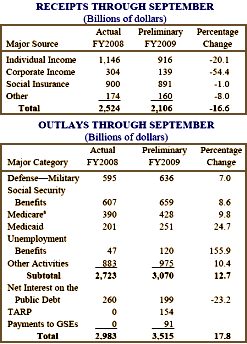Actually, Bruce Bartlett – a Reagan Treasury official and supply sider who remains conservative but has acidly critiqued Reaganomics and Bushanomics – took on not just Zuckerman but deficit hawks in general at his blog:Yesterday [Friday], Mort Zuckerman, owner of the New York Daily News, exercised his prerogative by publishing an essay in that publication complaining that "Obama’s spending and borrowing leaves U.S. gasping for air." …
According to the Congressional Budget Office’s January 2009 estimate for fiscal year 2009, outlays were projected to be $3,543 billion and revenues were projected to be $2,357 billion, leaving a deficit of $1,186 billion. Keep in mind that these estimates were made before Obama took office, based on existing law and policy, and did not take into account any actions that Obama might implement. …
Now let’s fast forward to the end of fiscal year 2009, which ended on September 30. According to CBO, it ended with spending at $3,515 billion and revenues of $2,106 billion for a deficit of $1,409 billion.
To recap, the deficit came in $223 billion higher than projected, but spending was $28 billion and revenues were $251 billion less than expected. Thus we can conclude that more than 100 percent of the increase in the deficit since January is accounted for by lower revenues. Not one penny is due to higher spending.
It should be further noted that revenues are lower to a large extent because of tax cuts included in the February stimulus. According to the Joint Committee on Taxation, these tax cuts reduced revenues in FY2009 by $98 billion over what would otherwise have been the case. This is important because the Republican position has consistently been that tax cuts and only tax cuts are an appropriate response to the economic crisis. …
I think there are grounds on which to criticize the Obama administration’s anti-recession actions. But spending too much is not one of them. Indeed, based on this analysis, it is pretty obvious that spending – real spending on things like public works – has been grossly inadequate. The idea that Reagan-style tax cuts would have done anything is just nuts.If Bartlett ever plans to work for Republicans again, it will surely be a different crew than has grasped the party reins for the past 30 years.
I’ve bludgeoned anyone reading this blog with graphs that show the record DEFICIT SPENDING of the Reagan and both Bush Administrations contrasted with Clinton’s paying down the debt. Now, Obama has been painted into the corner to take the hit for DEFICIT SPENDING that he couldn’t possibly control. Suffice it to say that he hasn’t increased spending period. This is a Republican Talking Point that never varies. Fiscal responsibility is, in fact, the public rationale for the current Republican Bloc "NO" voting. It’s the daily refrain from Congressional Republicans, the Right Wing Think Tanks, Fox News, and Talk Radio – underlying the cries of "Communism and Socialism." Yet it’s simply not true.
Fiscal Year 2009
A Congressional Budget Office Analysis
… Individual income taxes, the largest source of tax receipts, account for more than half of the total drop in receipts, declining by $230 billion (or 20 percent). Receipts of social insurance taxes, the second largest tax source, fell by about $9 billion (or 1 percent).
Withholding of individual income and payroll taxes in each month of fiscal year 2009 was lower than in the same month in the prior year, decreasing by about $117 billion (or 7 percent) for the year. Withholding began to fall markedly in December, with the weakening economy and low year-end bonuses, and fell further as a result of tax reductions in ARRA. Nonwithheld receipts declined by $142 billion (or 28 percent). About two-thirds of that decline resulted from lower payments of 2008 taxes, and the remainder represented lower estimated payments of 2009 taxes—reflecting sharp declines in nonwage income stemming from the recession. Refunds in 2009 were also lower, by $22 billion, partly offsetting the decreases in payments of individual income taxes.
Corporate tax receipts declined for the second consecutive year, falling by about $166 billion (or 54 percent). That decline continues a pattern that began in the middle of 2007 and stems from (1) weakness in corporate profits, (2) recently enacted legislation, most notably provisions that allow for more rapid depreciation of assets, and (3) the ability of firms to use current-year losses to reduce tax liabilities from previous years. Corporate receipts rose by nearly 40 percent annually, on average, from 2003 to 2006 but are now almost back to the 2003 level…
… Nearly 60 percent of the growth in spending for programs and activities other than net interest on the public debt resulted from three sources: outlays recorded for the TARP ($154 billion), Fannie Mae and Freddie Mac ($91 billion), and ARRA (over $100 billion). Other federal spending was up by about 9 percent, compared with the 7 percent average growth in outlays over the past five years. Payments for net interest on the public debt decreased by $60 billion in 2009, somewhat mitigating other increases in spending. That decline resulted mainly from lower short-term interest rates and lower costs for inflation-indexed securities.
Excluding the effects of ARRA, spending for unemployment compensation more than doubled in 2009, because of rising unemployment and increased benefits. Spending for Medicare rose by 10 percent, and outlays for Medicaid (excluding ARRA) and Social Security benefits grew by 9 percent. Defense spending increased by 7 percent in 2009, CBO estimates, lower than the average growth rate of over 9 percent during the past decade…


Sorry, the comment form is closed at this time.